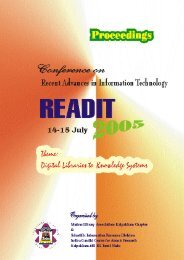IGCAR : Annual Report - Indira Gandhi Centre for Atomic Research
IGCAR : Annual Report - Indira Gandhi Centre for Atomic Research
IGCAR : Annual Report - Indira Gandhi Centre for Atomic Research
You also want an ePaper? Increase the reach of your titles
YUMPU automatically turns print PDFs into web optimized ePapers that Google loves.
Summer Training in Physics and Chemistry (STIPAC 07) - May 28 to July 6, 2007<br />
Students, Faculty Members and Organizers of STIPAC - 07<br />
Like in the past, this year too a six week summer training program in physics and chemistry<br />
(STIPAC-07) was organized by <strong>Indira</strong> <strong>Gandhi</strong> <strong>Centre</strong> <strong>for</strong> <strong>Atomic</strong> <strong>Research</strong> -Kalpakkam <strong>for</strong><br />
students entering their final year of regular or integrated M.Sc (Physics/Chemistry) during<br />
May, 28 - July 6, 2007. This six week long programme comprised of both theoretical lecture<br />
courses and hands-on laboratory experience through projects. This programme was aimed at<br />
motivating the students to pursue a career in research. The theme <strong>for</strong> this year's course was<br />
Physics and Chemistry of Nanomaterials.<br />
Forty students (Twenty from Physics and twenty from Chemistry) were selected from about<br />
500 applicants in physics and chemistry. The selection was done based on their academic track<br />
record and the write-up on "why you think size matters in the physical & chemical properties of<br />
matter". Care has been taken to select students from as many states as possible and as many<br />
universities/colleges as possible. This resulted in selecting 20 students from within Tamilnadu<br />
and 20 students from outside representing 10 states <strong>for</strong> both the disciplines. The selected<br />
students are provided a stipend of Rs. 3000/- per month, and their travel expenses are<br />
reimbursed.<br />
The six week technical program of STIPAC course consisted of 90 hours of lectures and 90<br />
hours of project work <strong>for</strong> both physics and chemistry students. The guest lectures were 15 and<br />
8 <strong>for</strong> physics and chemistry respectively. The lectures were delivered by senior scientists and<br />
the guest lectures were delivered by eminent speakers drawn from reputed institutes and<br />
universities from all over India. The topics that have been covered during the lectures in<br />
physics include synthesis and characterization of nanomaterials, nanoparticle dispersions and<br />
gels and the influence of size on optical, magnetic, mechanical, electronic and transport<br />
properties. The topics that have been covered in chemistry were classified in three broad<br />
categories namely, core subjects in chemistry, application in nuclear energy programme and<br />
nanoscience & technology. The special lectures covered a variety topics in biotechnology,<br />
nanotechnology, fluorescence of novel organic compounds, ab-initio quantum mechanical<br />
approach in understanding spectroscopy, sensors and storage devices. Students have gained<br />
hands on experience through their project works. They also got the opportunity to listen to the<br />
special lectures on "Random walk" and "Status of sodium cooled fast reactors with closed fuel<br />
cycle" by Dr. Baldev Raj, Director, <strong>IGCAR</strong>; "Opportunities <strong>for</strong> scientists in Fast Breeder Reactor<br />
Technology " by Shri. Prabhat Kumar, Project Director, BHAVINI and "Key elements of Periodic<br />
Table - Relevance to DAE" by Dr. P.R. Vaudeva Rao, Director, CG& MMG.<br />
190

















